It was with deep anguish that I received confirmation early Friday afternoon from Faroese police authorities that over 100 pilot whales have been brutally slaughtered in the town of Vestmanna in the Faroe Islands. These numbers have undoubtedly since risen as locals continued throughout the day to carve up these sentient and intelligent beings who violently lost their lives to bloodlust and greed in a cowardice act of cultural tradition referred to by locals as "grindadrap". In Faroese, "grind" literally translates to pilot whale, while "drap" translates to "murder" thus representing the largest extermination of marine mammals in all of Europe -- literally whale murder. Well, at least we can call a spade a spade here.
Upon recently returning from the Faroe Islands as part of The Sea Shepherd Conservation Society's pilot whale defense campaign, I am deeply saddened by this gruesome turn of events as our presence there over the course of the last 2 months directly and successfully deterred these annual atrocities from taking place. Our ground crew spent over 6 weeks patrolling the hunting bays on a daily basis and engaging with locals in order to gain a firsthand perspective surrounding the grind while working in close collaboration with Sea Shepherd vessels and crews of the Steve Irwin and Brigitte Bardot. Our main objective was to keep pilot whales as far away from the Faroes Islands as possible so that they may continue to roam free as they have for over 30 million years.
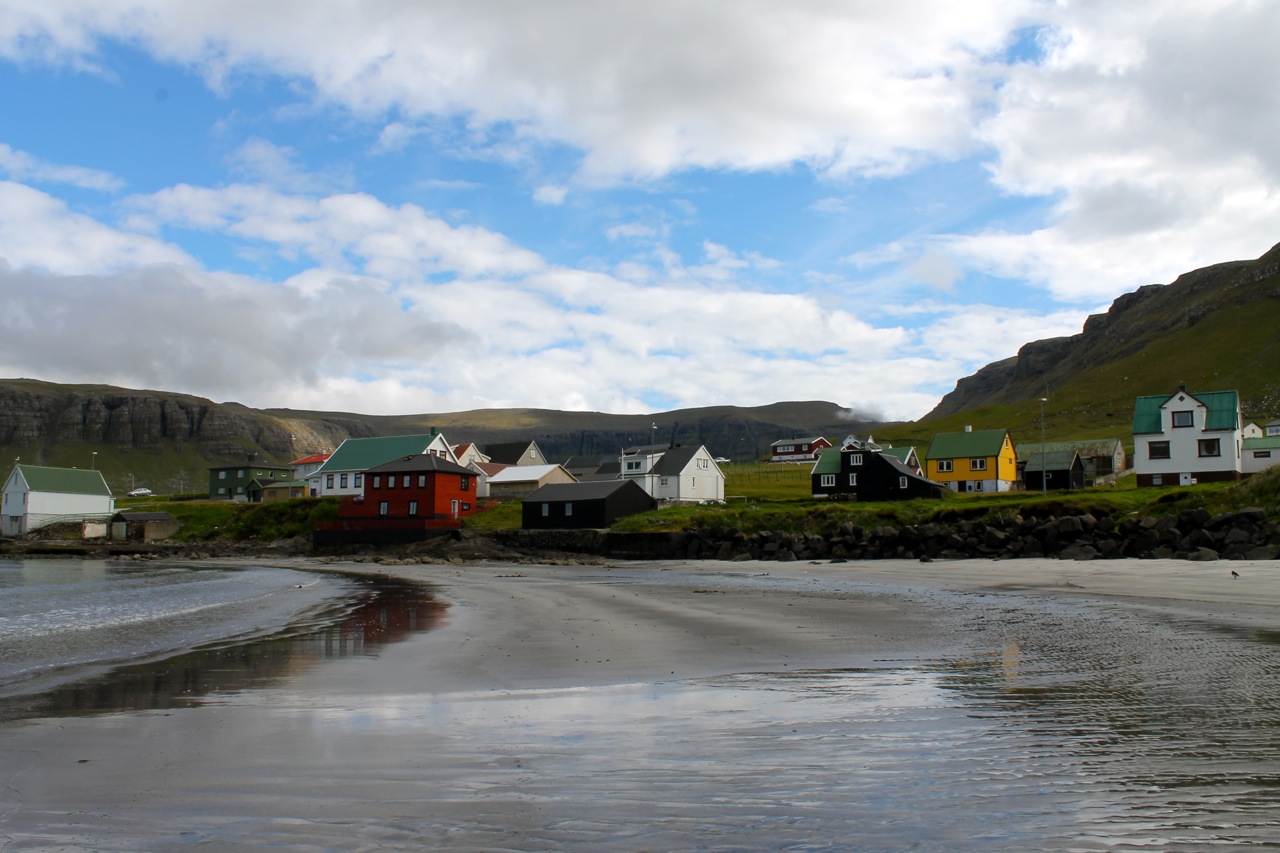
Vestmanna bay on a typical and serene day, Photo: Bassett
Every year during the summer months the Faroese massacre entire pods, or families, of pilot whales as they migrate through adjacent waters. Once a pod is spotted at sea, the local police are notified and give the official clearance to commence a grind which is carried out by local men who are designated to partake in the community ritual. At this point, the whales are forcefully driven into one of 23 hunting bays or fjords by small fishing boats where locals rush the shallow waters to annihilate the corralled whales by slashing through their thick neck tissue in order to sever the spinal chord -- an endeavor that Faroese claim takes only a matter of minutes although eye witness reports indicate that it often takes much longer before the suffering mammals are put out of audible misery. One can't help wonder which is worse -- enduring the agonizing pain itself or the trauma of hearing the cries of family members as they are brutally butchered before one another's eyes.
Ah yes, something is indeed quite rotten in Denmark's little protectorate -- an archipelago of 18 islands located in the North Atlantic, northwest of Scotland and halfway between Norway and Iceland. Whaling in the Faroe Islands has been practiced since the time of the first Norse settlements some 1100 years ago on the islands and locals fiercely defend the brutality, citing that written records of drive hunts in the Faroe Islands date back to 1854. Of course, those of us who are of the scientific, not to mention intuitive, understanding that cetaceans are a socially complex, self-aware and highly sophisticated sentient species, consider the annual bloodbath nothing short of genocide.
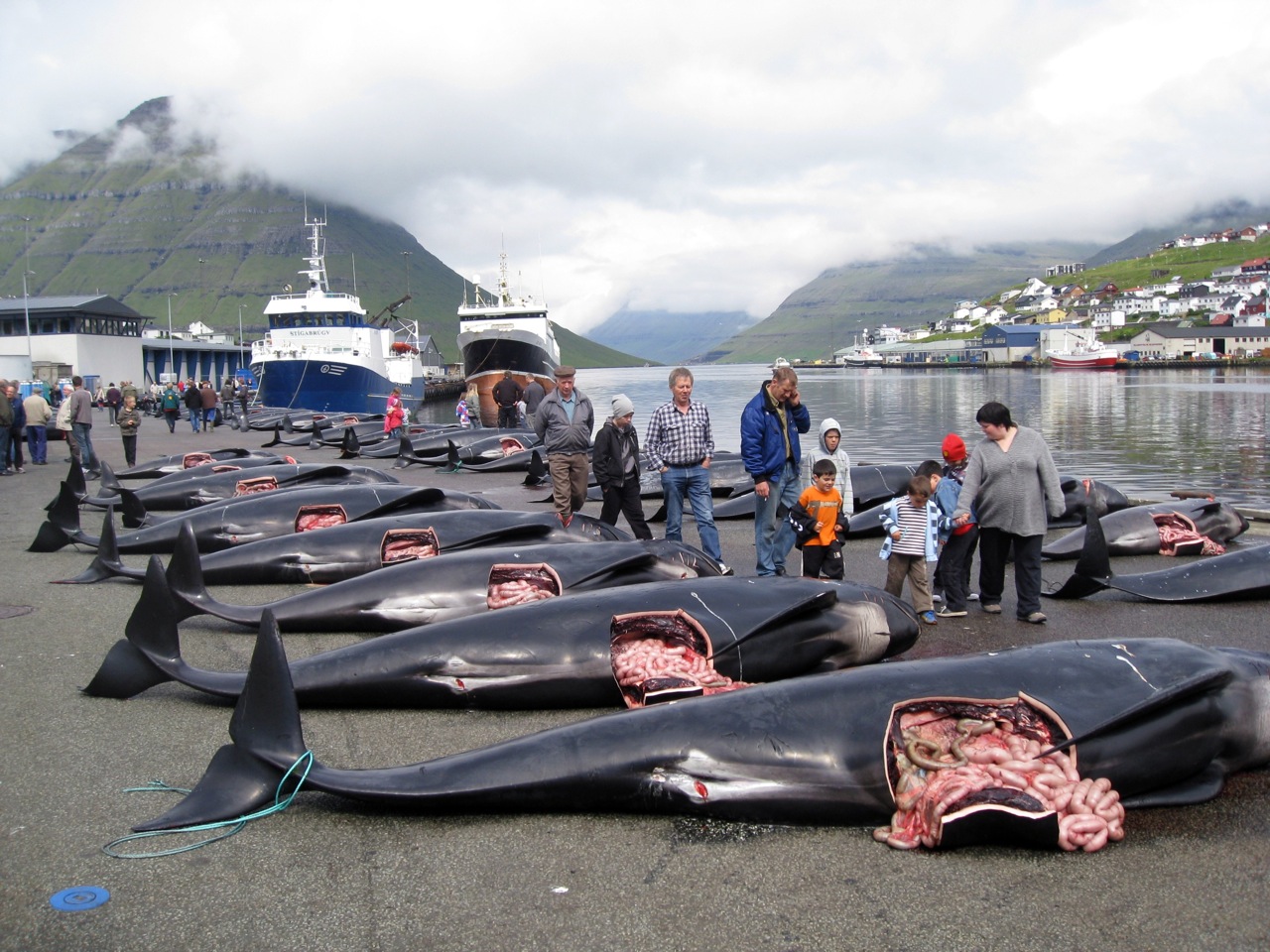
The grim reality of "cultural tradition", Photo: Peter Hammerstedt/Sea Shepherd
According to Captain Paul Watson in a recent commentary:
Cetaceans possess large, complex four-lobed brains, much larger brains in comparison to our smaller human three-lobed brains, with more convolutions on the neo-cortex area than our own. At a neurological level, cetacean brains display many of the features associated in human beings with sophisticated cognition. These are all socially complex sentient beings, and as recent scientific publications have confirmed, sperm whales and dolphins have demonstrated the ability to identify each other by individual names.
To simply dismiss these scientifically proven facts seems both obtuse and short sided, however detachment from reality, denial, blind patriotism and other such psychological defense mechanisms apparently provide comfortable states of existence for some. In the Faroes, it appears that certain types of socially transmitted behavior allow for the justification and even a certain level of respect for the pilot whale hunt.
It therefore comes as no big surprise that the whalers jumped at the first opportunity they had to hack up a bunch of unassuming whale as sociopathic tendencies and social deviant behavior in general is often times further perpetuated by the group mind mentality, which evidently is the case in the Faroes Islands. Yet, it is somewhat bewildering how the vast majority of people of this legendary land would choose or allow to be portrayed by the actions of a few as modern day barbarians rather than an evolved and empathetic society. Since opposition to the grind is seldom heard, there exists a level of complacency that allows for it to continue to be a part of the society's moral fabric. Apathy is a nasty little culprit. Added Watson:
The Faeroese demand that their culture be respected, but how can civilized people anywhere respect such a barbaric tradition and barbarism as exactly what it is - an affront to decency, an insult to humanity, and a disgrace to civilization. Our task now is to make the rest of the world view the grind for what it is - an obscenity and a disgrace upon the escutcheon of humanity. And hopefully more and more Faeroese will view it as the rest of the world does and compassion will triumph over cruelty. We have the most perfect weapon for the task -- the camera -- and we intend to use it.
While on the surface there appeared very little remorse or shame for the cruel and out dated hunts, locals were keenly opposed to having film crews or cameras around to document their supposed "proud cultural tradition." Ironically I was even physically assaulted by a woman who was concerned about being negatively portrayed in the media -- hmmm.
Locals who support the grind still represent the majority and insist that pilot whale is a necessary food source even though both local and international scientists warn of the very real dangers of eating this toxic meat riddled with PCBs and mercury. Faroese health authorities continue to advise women not to consume pilot whale meat while pregnant and warn that adults should eat no more than one to two meals a month. Given the small amounts of pilot whale meat therefore consumed in the suggested Faroese diet, it is no longer a staple food but rather a specialty item that is certainly not needed for subsistence at this point in time.
Since the pilot whales are not used or exported for commercial purposes, unlike the whaling practices of Norway, Iceland and Japan, the Faroese seems to further possess a sense of moral justification surrounding the hunt. This stance appears nothing more than a feeble attempt to appease an already weakened argument. Two wrongs simply do not make a right. Furthermore, the goal of The Sea Shepherd Conservation Society is to stop the slaughter of innocent life before it comes to the table -- whether locally or abroad.
The whalers continually explained how the pilot whale is killed with the most modern of tools and claim, against documented evidence, that the kill time on average takes less than 2 minutes. After speaking with many local eyewitnesses of past grinds, it is evident that this assertion is simply a falsehood. Last year in the small town of Klaksvick, over 230 pilot whales were literally hacked to death over the course of several excruciating hours pointing to the community's incapability to slaughter, process and distribute the meat efficiently or in a "humane" manner and further pointing to the lack of precision and standardization in the killing methodology. Human error is always a factor that needs to be taken into consideration.
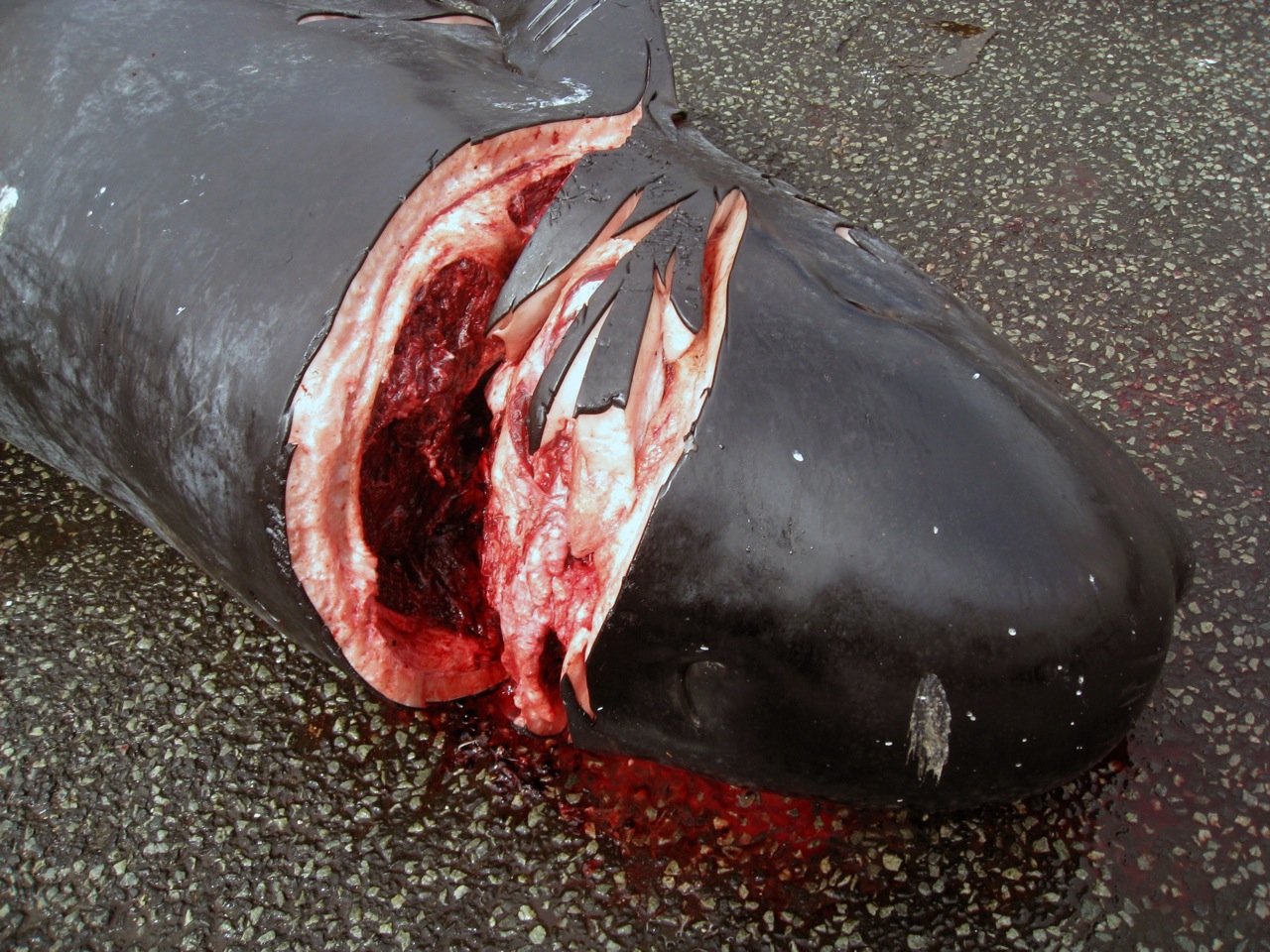
Did this whale die "humanely" in under 2 minutes? Photo: Peter Hammerstedt/Sea Shepherd
Furthermore, while the Faroese area a culture deeply rooted in Christian faith with almost 90% of citizens belonging to one of the two national church denominations, it appears that the Faroese feel a level of superiority over the whales and are not shy to voice their religious opinions surrounding the hunt. However, perhaps they may have skipped over specific biblical texts that directly condemn the killing of certain marine species:
Leviticus 11-9-10-11-12
11-9: "These you may eat of all that are in the water: Whatever in the water has fins and scales, whether in the seas or in the rivers -- that may you eat."
11-10: "But all in the seas or in the river that do not have fins and scales, all that move in the water or living thing which is in the water, they are an abomination to you."
11-11: "They shall be an abomination to you: you shall not eat their flesh, but you should regard their carcasses as an abomination."
11-12: Whatever in the water does not have fins or scales -- that shall be an abomination to you.
Since the number of whales butchered often exceeds that which the local population can possibly consume, one must also question what really motivates locals to continue what the majority of the European community opposes and considers an outdated tradition.
Both Iceland and Norway have been rejected for inclusion in the European Union due to their on going whaling policies, yet the Faroes continue to reap the rewards of E.U. subsidies without obligation to adhere to E.U. regulations. According to Watson:
Europe has made it plain that the slaughter of whales is not consistent with the ideals of European civilization. These subsidies should be denied or else it translates into discrimination against Norway and Iceland. Denmark must be pressured by the E.U. to withhold subsidies until The Faroes abides by the regulations protecting whales and opposing cruelty that all Europeans must respect.
Furthermore, the International Union for Conservation of Nature (IUCN) states that the species is "data deficient" and the actual number of long-finned pilot whales that exist in the ocean today is unknown. The IUCN estimate is that there are approximately 200,000 short-finned pilot whales, and that the number of long-finned pilot whales are much less. Yet the Faroes continue to take the fate of the species into their own hands by taking as many as they deem fit on an annual basis. This same mentality of greed wiped out similar cetacean species in the past such as the North Atlantic gray whale which was hunted to extinction and the critically endangered Western North Pacific which to date has fewer than 100 individuals remaining. Without concrete data on the numbers of pilot whales and given the rates of maturity needed for stock maintenance and/or recovery, the Faroese are literally playing a guessing game when it comes to statistical analysis.
Many grind supporters will further argue that the pilot whale meat is wildly "harvested" and not factory farmed, thus making it more ethical than the killing of pigs and chicken in the rest of Europe. Of course, those of us who do not eat any type of meat, consider this to be a moot point. Given modern technology and local farming, there is very little excuse to slaughter innocent marine mammals simply to satisfy the palate of a few.
There is also a considerable amount of waste involved in the hunt as was evidenced by the unveiling of several pilot whale graveyards throughout the Faroe Islands by Sea Shepherd in 2010, which we somberly revisited again this year. We also recently came across the horrific site of piles of pilot whale meat in local dumpsters further pointing to a sincere lack of need, not to mention respect, for the animals.
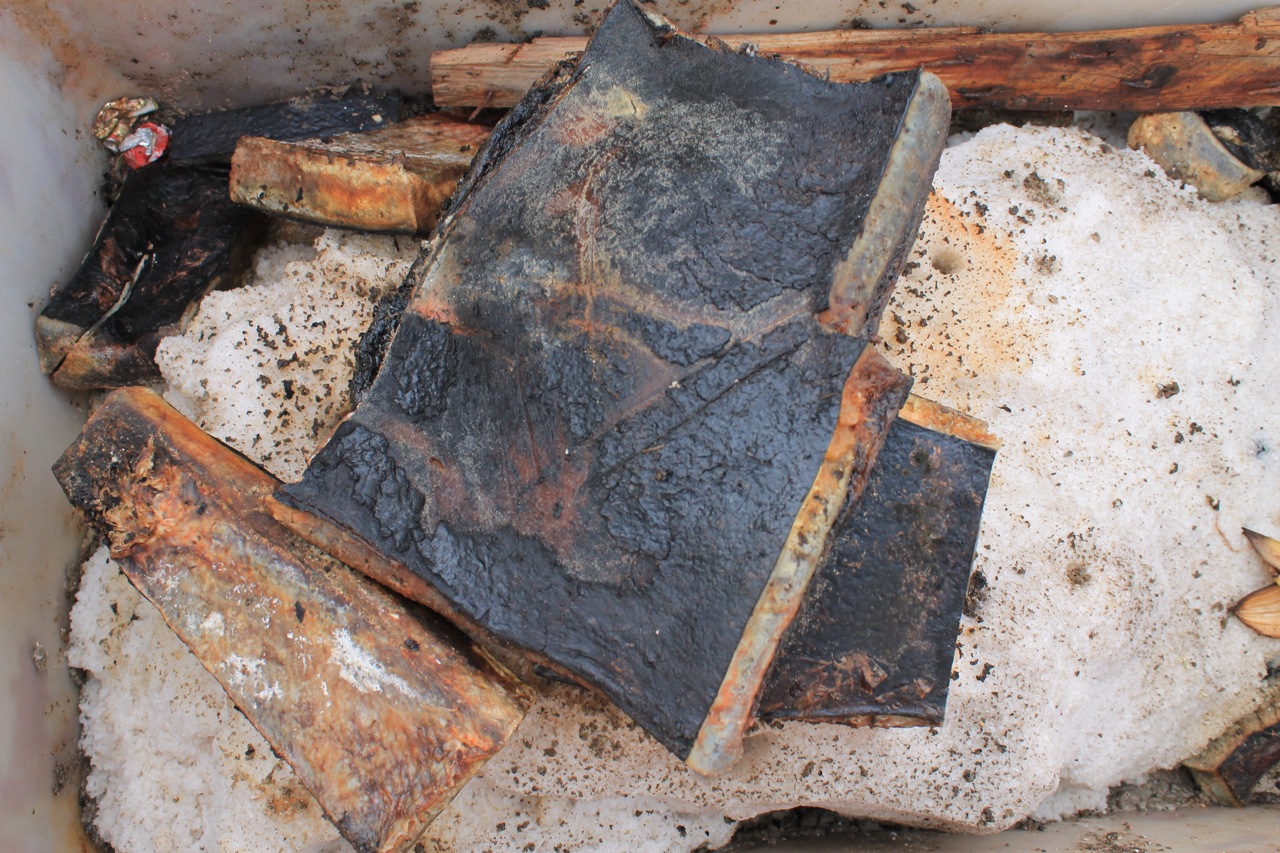
Pilot whale meat discarded in local dumpsters, Photo: Bassett
Since many of the Faorese hold very strong views about Sea Shepherd's mission and presence in the Faroe Islands, we offered to have Paul Watson speak directly to the community in an open forum format, but we were met with all sorts of excuses and turned away from the handful of venues that we approached and ultimately refused. It is perplexing that in a culture that proclaims to be an open democratic society, that they would not take the opportunity to have an honest discussion about the subject matter with the very person whom they seem to openly condemn at every given opportunity. However it appeared that they were not afraid of the dialogue that may transpire but rather the media attention that could potentially expose their supposed national pride and joy. It certainly doesn't take a Freudian scholar to recognize the inconsistencies as the rivers of denial and shame (whether conscious or subconscious) apparently run quite deep in the Faroe islands.
While it is of great concern to locals that their picturesque nation which offers some of the most stunning and dramatic scenery to be found on Earth has received such an atrocious reputation in the international arena, this is clearly a fate that they have brought upon themselves. These enchanted isles separated by sounds and fjords, sharp cliffs and crystal streams even earned the Faroes Islands the distinction of being one of "the most appealing destinations in the world" in the past by National Geographic Traveler. It is baffling as to why the Faroese would wish to jeopardize their entire tourism industry of which their economy so desperately depends by indulging in such ferocious activity. After all it is only a matter of time before an international tourism boycott will take a very real toll. Perhaps hitting people in the wallet is the only way to effect change upon those whose hearts and minds sadly already appear devoid and bankrupt.
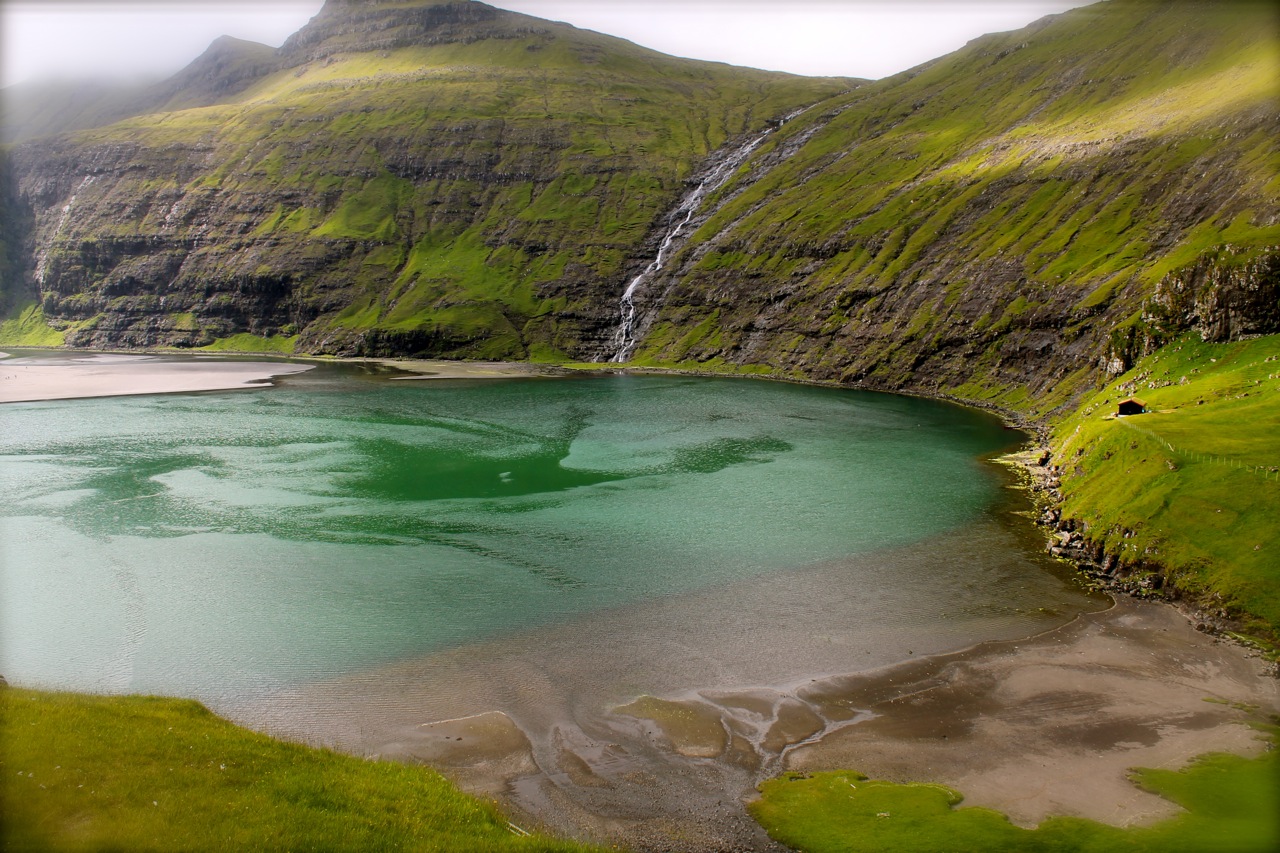
Are the Faroese willing to sacrifice tourism for cultural tradition? Photo: Bassett
It seems obvious that the task of restoring dignity to the Faroes will be be left in the hands the younger generations by putting an end to this grotesque and outlived tradition. By leading the way through example, the Faorese youth have an opportunity and obligation to let the world know that there is no acceptable reason for whaling to take place in the 21st century and must insist that the countries of Iceland and Norway follow suit. While I remain hopeful that this will be the case I am also concerned for the safety and numbers off the pilot whales in the mean time and at the same time comforted in knowing that organizations like the Sea Shepherd Conservation Society exist to provide protection, media exposure and international pressure to put an end to such ecological injustice. Evolution often requires provocation and if the Faroe Island wish to continue to slaughter innocent and threatened pilot whales, it is certain that they will be met with swift and stern opposition. The Faroese have drawn a line in the sand and compromise is simply not a word in Captain Paul Watson's vocabulary.
For more information on the grind, please visit the Sea Shepherd website.
For more information on my personal experience in the Faroes, please see my field reports featured on MYOO.
Sign the PETITION here to let National Geographic know that the global community can not support tourism to the Faroe Islands while these slaughters continue.